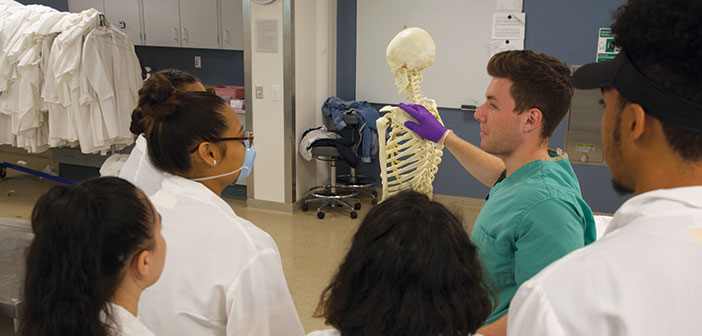Local teens get a firsthand look at health careers.
Before last summer, Esther Duran, a high school student from Warren, RI, was uncertain about her career path.
But after participating in the HealthCORE program—which gathers Rhode Island high school students for two weeks over the summer to learn about the range of opportunities in health care fields—she learned about a profession that fit her perfectly.
“Growing up, all I knew was that to be in the medical field was to only be either a doctor or a nurse,” Duran says. “When I found out about the physician assistant career, I was super thrilled.” Becoming a PA won’t require attending medical school, and will allow Duran to explore a range of medical specialties throughout her career.
The HealthCORE program, which largely accepts students from groups historically underrepresented in medicine, strives to spark interest in medical careers by exposing teens to the wide array of options. They met at the Warren Alpert Medical School to hear from panelists and explore a range of activities, trying out everything from administering patient exams to designing a new stethoscope. Students delved into lesser-known areas like narrative medicine and health policy, and even held a preserved human brain.
“We would hope with everything that we’re throwing at them, that something strikes someone,” says Andrew Del Re MD’21, one of the HealthCORE leaders. One student was especially inspired by a talk on global health, while another found a stronger interest in dentistry, he says.
“These are opportunities that many of us found after college. Some of us were lucky to find them during college,” says Peter Mattson MD’20 ScM’20, who created the HealthCORE program in 2017 with support from the Albert Schweitzer Fellowship. For many, the motivation behind choosing a career in medicine involves a lot more than the science, he adds.
HealthCORE’s leaders connect students with opportunities to explore the impact of careers in their areas of interest, like shadowing doctors or volunteering in clinics. They hope to partner with the Rhode Island Department of Health to offer students opportunities within their own communities, so they can feel empowered by directly affecting the health of those around them. “Our goal is to light the fire and keep the fire going,” Del Re says.
As students’ passions and plans evolve, the program leaders intend to remain connected as advisers to help navigate the academic and professional challenges of pursuing health care careers. Next summer, HealthCORE will offer teaching assistant positions for past students. And the team will continue to tailor the program to the interests of its participants.
“We’re treating people without understanding communities,” says Natasha Furtado Dalomba MD’21, another HealthCORE leader. “It’s important that we have all sorts of people and backgrounds represented in medicine, which is not the case right now. And to do that, we really need to start from the very beginning in improving education.”
Learn more at thehealthcore.org.




